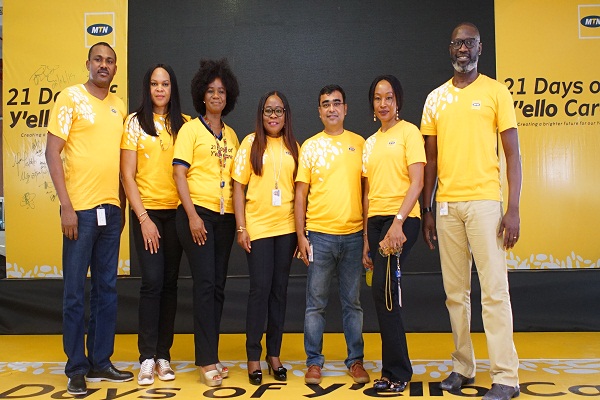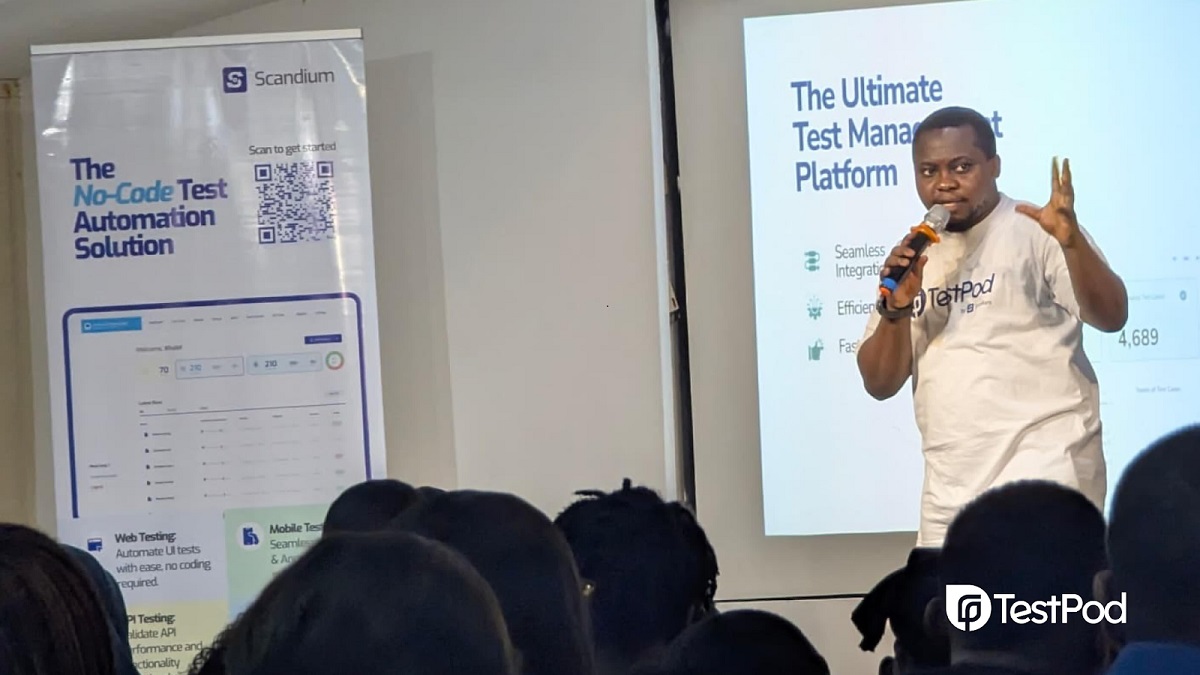Telecom
UBA, Ecobank, Others Turn to IBM Hybrid Cloud and AI Solutions to Accelerate Digital Innovation

IBM on Wednesday announced that major financial institutions across Africa have selected hybrid cloud and AI capabilities from IBM to unlock digital innovation and continue their work to develop digital-first solutions, ultimately broadening access to financial services on the continent.

COVID-19 continues to accelerate the already rapid changes that were happening across the financial services sector in Africa, fast-tracking the adoption of digital technologies to boost financial inclusion. With over 475 million Africans expected to be mobile internet users by 2025 GSMA –The mobile economy sub-Saharan Africa 2020, digital and mobile play a critical role in facilitating the delivery of digital financial services to consumers who transact on their mobile phones.
As banks focus their efforts on open innovation, security and high-value services, hybrid cloud solutions have become increasingly important to deliver seamless and secure digital banking experiences.
“Enterprises, especially those in highly regulated industries like financial services, face unique challenges when it comes to balancing innovation and regulatory compliance,” says Alan Peacock, General Manager, IBM Cloud.
“For decades, IBM has been fuelling the transformation of the financial services industry, bringing IBM’s trusted industry experience and leadership in security and data privacy to help banks modernize, transform operations and drive innovation.”
According to IBM’s COVID-19 future of business study, more than 59% of the organisations that participated said that the pandemic accelerated digital transformation, and more than 75% of responding executives indicated they expect changed customer behaviour to continue after COVID-19.
As companies in the financial services sector are speeding up transformation, IBM hybrid cloud and AI solutions are supporting their drive to accelerate digitalisation in different parts of the continent.
“In the past year we have seen banks navigate changes brought on by a growing preference for digital and mobile solutions, increasing smartphone penetration and the demand for convenience, innovation, and simplicity from today’s modern consumer, says Angela Kyerematen-Jimoh, Regional, General Manager for IBM North, East and West Africa.
“As banks across the continent take advantage of the opportunity to provide digital financial services which boost financial inclusion, IBM is working with Africa’s leading financial groups to deliver intelligent, cloud-based, digital-first innovation through IBM’s hybrid cloud and AI capabilities.”
Ecobank, the pan-African banking conglomerate, with banking operations in 33 African countries, has adopted a hybrid cloud approach to extend its reach to millions across Africa.
Using IBM Cloud, Ecobank migrated their flagship mobile banking application to leverage the on-demand capacity of resources that can support sudden spikes in traffic on its mobile banking services. Ecobank also has access to other IBM cloud services that can be used to develop more innovative, digital-first solutions to enhance their own client experience.
With over 12 million customers on its flagship mobile application, Ecobank is on an accelerated digital banking transformation journey and is set out to expand its digital offerings and grow the 30 million digital transactions it already processes on its platforms. As part of this journey, the Pan-African banking conglomerate has built scalable business solutions which allow for ease of integration with third-party providers using their open digital banking platform for a growing customer base.
Pan-African bank, Nedbank has set out to deliver superior digital experiences to customers. To achieve this, the bank is modernising its core banking applications with a hybrid cloud strategy and has partnered with IBM to help bring digital products and services to life.
To take advantage of the flexibility and agility offered by modern cloud technologies on this digitalisation journey, Nedbank explored a hybrid multi cloud approach, adopted the IBM Garage methodology to implement IBM Cloud Pak for Integration.
Through IBM Garage, the bank was able to deep dive and explore fresh solutions and in a week achieved what would have taken them months. Faced with the need to integrate complex legacy systems, Nedbank turned to IBM Cloud Pak for Integration to help build a simplified and standardised integration approach to their cloud strategy.
This enables Nedbank to shift their legacy applications into the cloud and integrate with other cloud-based applications they are consuming as they modernise and position for future innovation.
Attijariwafa bank, the Pan African Banking and Financial Group, has adopted IBM hybrid cloud solutions software to advance the digitisation of its banking operations, and quickly bring new digital services to its customers, all in a secure and flexible environment.
Using IBM Cloud Paks that are built on Red Hat OpenShift, the leading bank will streamline and better integrate front-and back-office processes and to modernise business and IT operations.
By deploying IBM Cloud Paks, Attijariwafa bank will modernise and manage its core banking applications like its corporate banking application, on a secure, integrated and easily scalable environment.
This will allow a rich and simple customer interaction while decreasing the time to bring new offerings to market. It will also enable the banks’ employees to focus their effort and time on serving their customers better.
This collaboration with IBM supports the digital transformation strategy of the bank and facilitates a full modernisation of the bank’s operations in an open, hybrid cloud environment.
United Bank for Africa Plc (UBA), Africa’s global bank operating in 23 countries globally and with headquarters in Nigeria, has set a goal to grow its transaction volume significantly over the next few years and to deepen retail market penetration.
To achieve this, they would be required to attract the unbanked, acquire new customers through digital banking and retain existing customers by adopting a “No Transaction Must Fail (NTMF)” initiative.
Using IBM POWER9-based servers, Flash system storage and IBM PowerVC (Power system virtualization & cloud management), UBA set up a scalable, private cloud environment that is cost-effective taking the first step towards embracing a hybrid cloud model.
Customers’ needs are evolving as they seek banking services across channels and expect personalization. Co-operative Bank of Kenya turned to IBM to modernize their core banking platform and reach their customers on different channels including mobile and online while offering customized services driven by insights.
For this, they required a technology that would also empower their employees who work across teams to simplify processes, optimize customer data, while also achieving goals like reducing infrastructure and maintenance costs. With IBM Power and FlashStorage solutions, they now derive improved insights on customer data, faster query resolutions, quicker time-to-market on new services across channels – all backed by high available, scalable, cloud-and AI-ready technology.
Banco Mais, a leading bank in Mozambique, turned to IBM to help streamline its business processes and reduce turnaround times for customer-facing services. In the face of a growing competitive market locally, Banco Mais needed to develop financial service products faster to retain and gain market share.
Banco Mais implemented IBM Business Process Manager on Cloud service and was able to start projects quickly and deploy process application solutions without the need to build the IT infrastructure. By turning to this IBM Cloud solution, they could develop, test, run and monitor their business processes at a fraction of the time it would otherwise have taken. As a result, Banco Mais reduced turnaround time for loans by 60% and decreased the time it took to implement services that took 3 to 4 months by 85% to improve customer experiences.
Earlier this year, IBM announced the general availability of the industry’s first financial services-ready cloud platform, IBM Cloud for Financial Services, as well IBM Cloud Satellite. First revealed in 2019, the IBM Cloud for Financial Services is designed to help reduce risk for financial institutions, their partners and FinTechs, and innovate quickly with built-in controls that are adhered to by the entire ecosystem. IBM Cloud Satellite brings a secured, unifying layer of cloud services for clients across environments, regardless of where their data resides, delivering security, data privacy, interoperability and open standards found in hybrid cloud environments.
Telecom
MTN Plans Second Public Offer in Nigeria

Ralph Mupita, president,MTN Group, has announced plans to reduce its shareholding in MTN Nigeria through a public offer after it returns to profitability.

The group aims to cut its stake from 76 percent to 65 percent in line with its longstanding commitment to deepen local ownership, according to ITWeb, South African tech publication.
Mupita, who disclosed the plan during an editors’ roundtable meeting this week, said “The only localisation we have as MTN Group is we have potentially a sell-down in Nigeria at some point in time, approximately 11 percent. This is something we have said long ago, that over time, we would want more Nigerians owning the company, and we are prepared to sell down to 65 percent. We are at around 76 percent,” he said.
The anticipated offer would mark MTN’s second major retail public offering in Nigeria, following its 2021 sale of 575 million MTN Nigeria shares to local investors.
That offer was oversubscribed, resulting in the allocation of 661.25 million shares, including a 15 percent greenshoe option. This reduced MTN’s stake in its Nigerian unit to 75.6 percent from 78.8 percent.
More than 126,000 investors participated in that round, including retail and institutional investors such as Nigerian pension funds, representing approximately 6.5 million contributors.
At the time in 2022, MTN Group announced plans to further reduce its stake to approximately 65 percent from 75.6 percent.
Mupita confirmed that the Group would only proceed with a new offer once MTN Nigeria resolves its negative equity position and resumes dividend payments.
Currently, MTN Nigeria’s shares are trading at N235 per share.
Despite reporting a revenue of N3.36 trillion in 2024, a 36.03 percent bump from N2.47 trillion in 2023, it posted a loss after tax of N400.44 billion, a 192.25 percent rise from N137.02 billion in 2023.,
This negative performance was driven by macroeconomic headwinds, including record inflation and a steep devaluation of the naira, which raised operating costs and wiped out investor value.
MTN Nigeria has fallen behind MTN South Africa as MTN Group’s largest revenue contributor.
However, the Group is projecting a rebound in 2025, citing key drivers such as recent tariff adjustments, operational restructuring, and improving macroeconomic indicators in Nigeria.
Speaking at the roundtable, Mupita highlighted that the Group is anticipating a V-shaped recovery in Nigeria’s service revenue. He pointed to the recent structural reforms, such as the removal of fuel subsidies, the naira stabilisation, and improved dollar availability.
“The continued normalisation of these factors, particularly naira stability, should have positive impacts on consumer spending power and our business operations,” Mupita noted in the Group’s financial statement for 2024 recently.
Telecom
MTN Staff Commission New Set of Classrooms at Iwerekun Community High School

In a remarkable demonstration of corporate volunteerism, MTN staff, through the Y’ello Care initiative, have renovated a school block at Iwerekun Community Senior High School, Lakowe. This effort has restored hope and significantly improved learning conditions for both students and teachers.

The project, led by dedicated MTN employees, is part of the annual Y’ello Care campaign, which focuses on empowering communities through education, digital inclusion, and economic support.
Prior to the renovation, students at Iwerekun Community Senior High School faced challenges, including deteriorating classrooms that hindered effective learning. Recognising the need for intervention, MTN staff stepped in to transform the learning space, creating a safe, conducive, and inspiring environment for both students and teachers.
At the commissioning ceremony, Honourable Jamiu Tolani Alli-Balogun, Commissioner of the Lagos State Ministry of Basic and Secondary Education, acknowledged the significance of MTN’s contribution to education: “The education sector worldwide thrives on collaboration and commitment between public and private partners. MTN’s generous contribution is truly recognised, and I express my deepest gratitude for its unwavering commitment to supporting education in Lagos State. This new facility will provide a conducive environment for teaching and learning, enabling our students to reach their full potential.”
Representing the Ojomu of Lakowe, Prince Mukaila Adeola expressed the community’s gratitude: “This is a rare opportunity, and it is not every day that Lakowe benefits from such support. We truly appreciate MTN for this contribution, and we look forward to even more support in the future.”
The renovated school block is equipped with improved water supply and an inverter included in a serene environment that enhances the learning experience. This renovation will ensure that students and teachers have a more comfortable and sustainable academic setting.
Speaking on the significance of the project, Tobe Okigbo, Chief Corporate Services and Sustainability Officer (CCSSO) at MTN Nigeria, emphasised the personal investment of MTN staff: “I want to emphasise that this commissioning was made possible by the dedicated staff of MTN. Although MTN has a Foundation funded by 1% of the company’s annual profits, the credit for this commissioning goes to the MTN Nigeria staff members who, through their personal contributions, made this happen.”
Beyond the fresh coat of paint and structural improvements, initiatives like this create a lasting impact and a sense of hope in the lives of the students. The addition of a reliable power source and water facility means that students no longer have to struggle with poor infrastructure, allowing them to focus on their education.
For many students, access to quality education remains a challenge—not just because of financial barriers but also due to poor infrastructure, lack of resources, and limited teacher support. Programmes like Y’ello Care, alongside other education-focused volunteer initiatives, are helping to fill these gaps by creating safe, well-equipped learning environments and equipping students with knowledge beyond the classroom.
With the successful completion of the Lakowe school project, MTN reaffirms its commitment to education and youth development. The company encourages more organisations to embrace volunteerism and community service, as collective action remains a powerful force for societal progress.
Telecom
Scandium Introduces TestPod to Revolutionize Software Testing Across Africa and Beyond

Today’s software ecosystem is moving fast, building quality digital products has never been more crucial and more complex. As teams accelerate release cycles using a blend of manual and automated testing, one persistent issue remains: test management is fragmented.

That’s the problem TestPod, a newly launched test management platform from the team behind Scandium, is built to solve.
TestPod officially launched on Friday, April 11, 2025, offering software teams (whether in Africa or anywhere else) a much-needed solution to centralize and track their testing processes across platforms and test types. Whether it’s manual, automated, exploratory, accessibility, performance, or regression testing, TestPod brings visibility, structure, and speed to fragmented QA workflows.
“We spoke to over 200 teams at different African startups and enterprises, and despite having some automation in place, at least 90% are still heavily reliant on manual testing, just like their global counterparts,” said AbdulAzeez Ogunjobi, CEO and Co-Founder of Scandium Systems.
He explains that while Scandium’s AI-powered no-code automation suite is already being used across web, mobile, and API products globally, TestPod addresses a more foundational gap: organizing and managing all forms of testing—not just automation.
“Furthering our mission to help teams build bug-free digital products, we’re launching TestPod to help them organize their software testing operations, regardless of what kind of testing they need to do,” he added.
The timing is critical. According to the World Quality Report 2024–25, 68% of organizations are exploring Generative AI in their QA workflows, but most still lack clarity on what tests are running, what’s failing, and how test coverage aligns with ongoing releases.
Meanwhile, Africa’s digital economy is booming. A recent McKinsey report estimates it could contribute over $712 billion to continental GDP by 2025. The continent now holds more than 1.1 billion registered mobile money accounts, and in 2023 alone, over $1 trillion in transactions were processed across Instant Payment Systems, according to AfricaNenda. Regulations are tightening. Quality, reliability, and user trust are becoming more central, as the continent churns out more tech solutions in expanding sectors.
Testing isn’t just about automation. It’s about knowing what’s working and what’s broken.” noted Sodeeq Elusoji, CTO and Co-Founder of Scandium. “The real bottleneck in testing isn’t always a lack of automation—it’s lack of visibility. You can’t improve what you can’t track, and that’s what TestPod delivers.”
Unlike traditional tools that prioritize rigid workflows, TestPod is lightweight, modern, and flexible, designed for agile teams who need to move fast. It supports test case authoring, tagging, execution tracking, and real-time dashboards.
“Testing has evolved, but the way teams manage tests hasn’t caught up. We’ve seen teams with advanced automation pipelines still tracking test outcomes in spreadsheets and Slack.” said Jafar Alabi, Vice President of Products and Business Development at Scandium.
While it integrates seamlessly with Scandium’s no-code test automation suite, TestPod is framework-agnostic, making it a perfect fit for teams using Selenium, Playwright, Cypress or other custom test stacks.
Backed by a proven team with success building Africa’s first no-code test automation platform, Scandium has already achieved 6-figure ARR and powers test automation across 120+ organizations in 15+ countries. With TestPod, they’re expanding that impact even further—from test execution to test orchestration.
TestPod is now available at testpod.io. Early access is open globally and free for teams of all sizes.
As Africa’s tech scene continues to accelerate—with fintech, health tech, and mobility leading the charge, TestPod is built to ensure these innovations are not just fast but flawless.

 Telecom3 days ago
Telecom3 days agoMTN Plans Second Public Offer in Nigeria

 Broadcasting3 days ago
Broadcasting3 days agoSubscriber Withdraws Suit against MultiChoice, FCCPC over Price Hike

 E-Business3 days ago
E-Business3 days agoCyberattacks: ‘56 Percent of Cases Stem from Existing Logins

 News3 days ago
News3 days agoSenate Committee Partners with Kuda Bank to Tackle Compliance Crisis as Nigeria Loses ₦3.4 Trillion

 E-Business3 days ago
E-Business3 days agoKaspersky Presents Insight on 14% Increase in Spyware Attacks on Businesses in Africa @ GITEX Africa

 E-Financial3 days ago
E-Financial3 days agoSterling Bank Reiterates Transfer Fees Removal

 General News3 days ago
General News3 days agoOpenAI Sues Elon Musk Claiming Bad-Faith Tactics

 General News3 days ago
General News3 days agoFG Unveils e-Visa, Digital Entry Cards to Strengthen Border Security




























